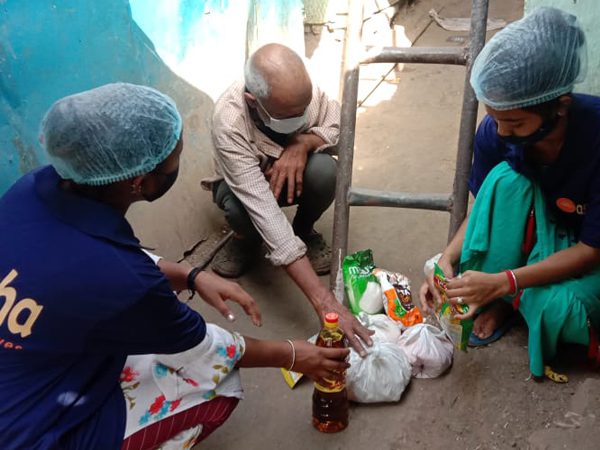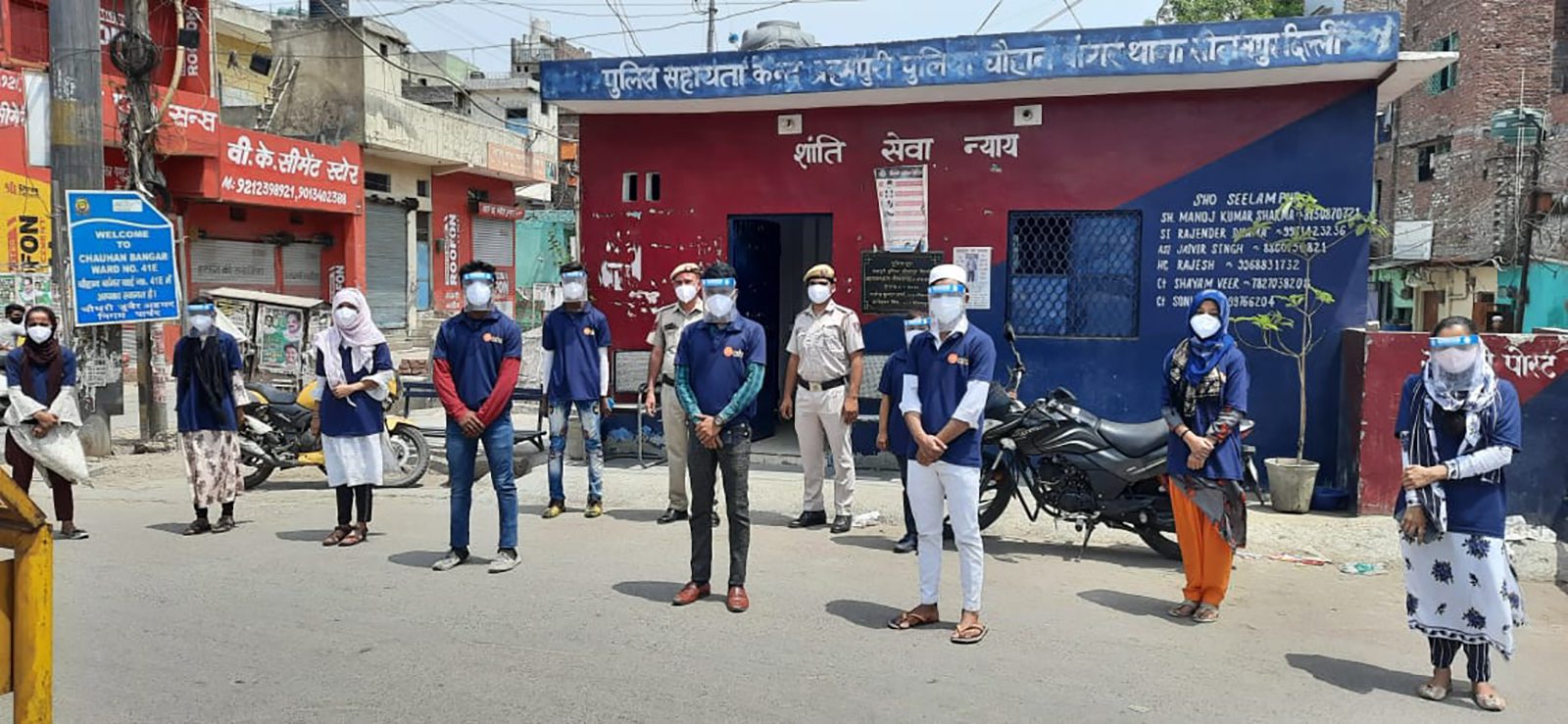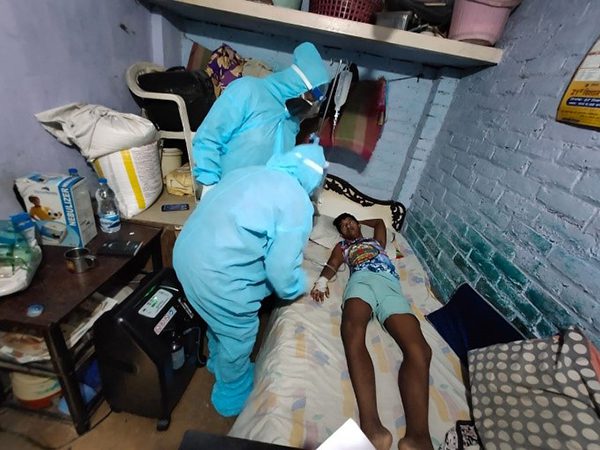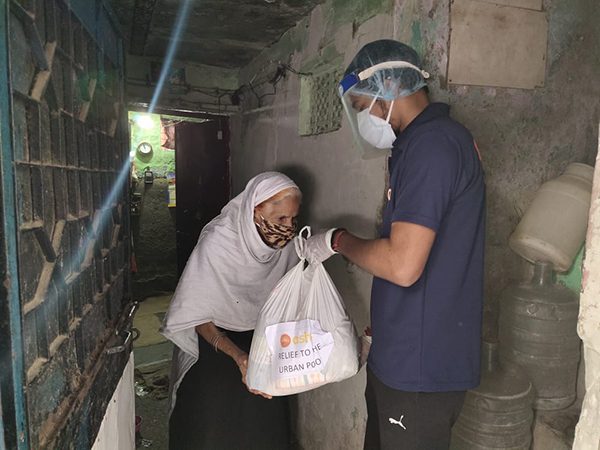Asha’s Covid-19 Public Health Programmes
Asha continued its Public Health Programmes in compliance with Covid-19 protocols, providing teams with full PPE and training to ensure their safety during the interventions.
Asha Provided Supplementary Nutrition for Malnourished Children and Women
To address the rising cases of malnutrition across the slums, the Asha health and nutritional experts developed high energy, high protein, high calorie laddoos and distributed these to children. To control malnutrition and anemia among women and girls, they developed a high energy, high protein, high calorie drink (sattu), and administered it and micronutrients through special clinics five days a week.
Asha Enhanced Immunity Levels
Building immunity has been key in preventing severe Covid infections. Asha provided community members, especially the vulnerable, elderly, and sick patients with micronutrients to enhance their immunity. During the lockdown, health volunteers distributed these supplements in homes and ensured that they were taken.
Asha Promoted Vaccinations
Asha registered its field team and the Warriors for vaccination and the entire Asha team and the Corona Warriors received the required two doses of vaccine. Asha promoted slum community vaccination drives to reduce vaccine hesitancy, and the Warriors accompanied residents for vaccination.





Asha continues its vital support after the pandemic
Maternal and Newborn Care
Immediately after the reopening, Asha organized clinics for children under 5, in compliance with Covid-19 protocols. They monitored their health and prescribed remedial action as necessary. Children across the slums were provided with doses of iron, zinc, and other vitamin supplements.
Geriatric Care
Along with their physical ailments, the elderly experienced mental stress, loneliness, and isolation. A team member assigned to an elderly person visited daily to provide much needed support. They helped with daily activities such as cleaning, shopping and chores, ensured that they took their medicines, and provided their mobile number in case of an emergency. After the lockdown, Asha conducted clinics and Community Health Volunteers (CHVs) also visited the elderly at home and accompanied them to the clinic, where they received medical check-ups and medicines. Elder abuse, particularly verbal abuse, increased during Covid-19. Asha advocacy groups intervened when they observed elderly residents being treated unfairly or poorly by family members.
Chronic Disease
After the lockdown, the Asha healthcare team initiated special clinics to screen people for diabetes and hypertension and to treat and monitor identified patients. They also educated patients on the importance of a balanced diet, lifestyle management, and exercise along with medication for controlling hypertension and diabetes.
Tuberculosis
The Asha team continued to accompany TB patients to the nearest government-run DOT (Directly Observed Therapy) centers, to continue their treatment regime. Ninety-nine percent of TB patients across Asha slums successfully received treatment and the death rate was less than 1%.
Menstrual Hygiene
Asha ensured menstrual hygiene in adolescent girls and women through the monthly distribution of feminine pads in all its communities.
Mental Health Support
In addition to the healthcare crisis, mental health was exacerbated in the pandemic by social, economic and livelihood challenges. As people lost their incomes and were confined to their homes, rising cases of domestic violence, mental stress, anxiety, depression, and loneliness occurred, sometimes leading to suicide. The Asha team and Warriors visited every house in their respective communities and provided people with support, carrying a message of hope and optimism.
Women’s Groups
Asha’s Mahila Mandal (Women’s Groups) activities began again when the lockdown ended, strictly observing Covid-19 protocols. Mahila Mandal members reduced cases of domestic violence by conducting regular home visits in their respective communities. Mahila Mandal members also lobbied the local Members of the Legislative Assemblies (MLAs) and government officials for community cleanliness and sanitization.



When the Pandemic struck
When the COVID-19 pandemic struck India in March 2020, the government immediately declared a national lockdown to curb the spread of the virus. Everything was shut down overnight. This had an immediate catastrophic impact on those living in the slums. The poorest of the poor, these people were mostly dependent on daily wages and other temporary jobs to survive. They lost their income with no warning: no work in the community meant no money and the possibility of starvation.
Within days, people from the slums started migrating to their native villages as a means for survival through the biggest health crisis of the century. The migration had other effects such as mental stress in the slum dwellers who decided to stay on. How would they survive? If they decided to go away, they faced an uncertain future.
The slum dwellers were at higher risk because they were unable to maintain social distancing. The living conditions and infrastructure in the slums made them vulnerable to a large-scale community outspread of the disease. These densely populated locations had very poor Water, Sanitation and Hygiene (WASH) facilities and there was no or poor awareness on behavioural practices to lessen their exposure to COVID-19. Hesitancy to wear masks and wash hands frequently was rampant. One can easily imagine the situation regarding health, hygiene, social distancing, and other basic precautions needed to prevent the spread of the virus.
The situation called for emergency action to control the crisis. There was no support system in the slums during that period as everything including the machinery of government and non-government organizations were unable to function because of lockdown.
The pandemic also put severe strain on the medical infrastructure of the city. The poor and vulnerable patients from the slums had no access to healthcare as public hospitals, healthcare centres, and dispensaries were closed as there was no manpower to operate them. The large hospitals were turned into special covid centres and OPD for general patients were not functioning. Most of the private hospitals, nursing homes and healthcare centres were either closed or functioning with minimal infrastructure and manpower, which exacerbated the crisis. The large private and corporate hospitals were beyond the reach of the slum community. Even the local community clinics which provided access to primary care in the community stopped functioning, as doctors and healthcare staff were not available. There was chaos and pain everywhere and even people with medical emergencies had no access to healthcare.
Immediately after the declaration of lockdown by the government, Asha, under the guidance of its Director, designed an emergency strategic plan of action for awareness and protection against COVID-19 for implementation across its project locations.
Asha formed a dedicated team of volunteers: high school and college students from the slum communities were trained, counselled, and prepared to work in the community as Corona Warriors.
The task was difficult initially, as the parents and family members were reluctant to let their children visit the communities amidst the pandemic. However, the Asha team explained to them that the young people were less prone with all the precautions in place. They reassured them about their safety, and were able to get their consent. They were also provided with good quality PPE for their protection and given training on covid appropriate behaviour while working in the community.
Within two days, a dedicated team of 300 Corona Warriors were ready and working on the ground. The Asha team continuously counselled the families to stay put. They and the Corona Warriors visited every house in their respective communities and implemented Asha’s Emergency Action Plan with passion, commitment, and dedication. The mission was simple: to save lives.
There was no public transport available because of the lockdown. Asha rushed its key team members to the project locations using Asha vehicles, after seeking special permission from the government, as movement of vehicles was restricted due to disaster management notifications and the curfew imposed in the city. Whilst the government eventually set up ‘feeding stations’, these were on the outskirts of the slums and were largely inaccessible to the most vulnerable in the slums.
The Asha team knew they had to react immediately to stave off a humanitarian disaster. Based on existing relationships and goodwill, they developed supply chains to obtain and distribute essential survival items and medicines. The team in each community prepared a list of key beneficiaries for priority intervention: families who had lost their income, the elderly, widows, pregnant women, children under-5, and differently-abled people. Asha activated its donor support base in the UK, US, and Australia to generate the necessary resources for this extensive emergency programme.
Asha’s Interventions
Disseminating urgent Covid related messages
The Asha team and the Corona Warriors immediately started spreading urgent covid related messages in the communities. People were told to stay at home, wear masks, maintain social distancing, and adopt regular handwashing to ensure their own as well as their family’s safety. Initially, there was some resistance when the team conducted home visits, but soon, the community realized that these were essential safety measures and Asha was their only friend in the crisis. The people were counselled not to panic and leave their homes, as this would accentuate the crisis. The team convinced them that Asha would support them and the worst period would soon be over. The community was educated regarding Covid appropriate behaviour and risk reduction measures, and masks were repeatedly distributed free of charge.
Working closely with Police and Sanitary officials in the project locations
To ensure smooth functioning of Asha’s Emergency Covid Relief Activities, the Asha team worked in coordination with the local police and the sanitary officials. Asha’s organizational credibility and long years of presence amongst the slum communities helped to establish this partnership. The police authorities supported Asha in its endeavours and even accompanied the team and Warriors during the house and lane visits. Asha ensured regular cleaning and sanitization of drains, lanes, public toilets, common spaces, and garbage removal in coordination with the sanitary inspectors to keep the area clean and sanitized to reduce the spread of the virus. Asha’s strategy to work in coordination with the police officials, sanitary officers, and government officials enhanced the impact and effectiveness of the emergency covid relief programmes.
Screening, Identification, and Testing of COVID-19
The Asha team and the Corona Warriors repeatedly visited every home in the community with thermal scanners and pulse oximeters to screen and identify patients with flu-like symptoms. People with any of the symptoms were advised immediately to self-isolate and go for RT-PCR testing in coordination with the authorities at the nearby testing centres. Asha ensured significantly higher testing compliance across its project locations in comparison to non-Asha slums.
Treatment and Referral
Patients with mild symptoms were provided treatment as per the covid treatment protocol. Severe patients, or patients having comorbidities, were referred to nearby hospitals. The Asha team and the Community Health Volunteers accompanied the patients to the hospital or the dedicated covid treatment centres and ensured their admission. Asha maintained a regular database of COVID-19 patients screened, identified, tested, treated, and referred to hospitals and dedicated covid centres. The families of the covid positive patients were asked to isolate too and the warriors made sure that they did not roam freely in the community and spread the virus. The Asha team made sure that separate toilets were assigned to the covid patients. The warriors ensured that the families in quarantine were provided with essential items and were not snubbed by the community at large.
Distribution of grocery bags and cash handouts
The start of the pandemic and immediate declaration of lockdown had a huge financial impact on the lives of the Asha slum communities as most people lost their jobs and income. Moreover, slum dwellers could not access the government ration shops as there was a huge rush and supply was limited. The elderly, widows, differently-abled, and other vulnerable groups faced severe problems as they could move out of their house because of the pandemic and arrange for life’s necessities. The crisis was so huge that most families were on the brink of starvation.
Asha procured groceries and put together packs consisting of cereals, pulses, cooking oil, tea, soap and other essential items and distributed them to every home, to get them through the crisis. Along with emergency food supplies, Asha also gave them cash to meet their other day-to-day needs like cooking gas, medicines, and other essential items.
The Asha team and Corona Warriors visited every home in the community and ensured that the emergency supplies reached each and every family. In addition, they helped the community residents to register for the government welfare schemes through an online registration process.
Asha’s Response to the Pandemic’s Second Wave
In April, 2021, India reported more than 300,000 daily cases of Covid-19. Hospitals and Covid-19 centers filled within days. Long lines of Covid-19 positive patients desperately waited at hospitals, hoping for a bed. Growing numbers of pulmonary patients with low oxygen levels led to an increased demand for oxygen and an acute oxygen crisis in Delhi. The death rate rose significantly.
- During this time, Asha scaled up and conducted house to house visits identifying people with any flu-like symptoms. The Warriors encouraged the community to report cases without fear of ostracization. People who had come into contact with positive cases were put on a preventative regime.
- Asha developed a strategy for home treatment of Covid-19 patients, categorizing patients into mild, moderate, and severe, and started treatment as per protocols. The teams monitored mildly symptomatic patients in regular tele-consultation with the Asha doctor, as mild patients had a high risk of becoming moderate or severe in a short time. Patients moderately ill were treated with anticoagulants and bronchodilators through nebulization to stabilize their condition.
- Severely ill patients who were refused hospital admission were treated in their homes as per protocols, with patient or family member consent. Treatments included intravenous and oral medicines, nebulization with steroids, and frequent monitoring of oxygen levels. Severely ill patients received oxygen from concentrators if their oxygen saturation (SpO2) was below 94.
- During this unprecedented crisis, the Asha team’s commitment and dedication saved hundreds of lives. Generous donations from UK, US, and Australia enabled Asha to obtain the resources needed for this crisis. Of all 688 confirmed patients suffering from Covid-19 across the communities, only one death occurred, a truly remarkable achievement.


Covid-19- Asha’s response to the Third Wave
During the last week of December 2021, the third wave of the covid pandemic stuck Delhi and the rest of India. It was dominated by the variant of the virus named Omicron which was more infectious and fast-spreading compared to the Delta variant. In a very short period, the cases started rising exponentially and more than 20,000 infections per day were recorded in Delhi.
Asha immediately geared up its infrastructure to control the spread of the virus and protect the slum communities across its project locations in Delhi. The Asha team and the corona warriors intensified their efforts to spread the awareness and sensitization messages through the door to door and community visits on the necessary covid protocols and compliance with covid appropriate behaviour.
High-quality masks were distributed in the slums and their proper usage was explained to the community residents. The Asha team ensured that everyone used double masks and used only clean masks.
The Healthcare team made daily home visits to identify people having symptoms of covid and were immediately isolated and put on treatment as per home care protocol. The Asha team ensured that the entire team and the corona warriors were fully protected with proper PPE.
Asha also decided to conduct RTPCR tests for people with symptoms of covid across all the slums in its project locations to understand the positivity rate and the extent of spread. Based on the results, the strategy for containment and controlling the spread of the virus was analysed.
Along with awareness, precaution and treatment, Asha intensified the vaccination drive across the slum communities. The precautionary or the booster dose of the vaccine was started in January’2022 as per the Government of India guidelines for frontline healthcare workers and those above the age of 60 years. Also, vaccination for the 15-18 years age group was started.
Asha collaborated with the Delhi Government and organized vaccination camps at all the Asha centres. The entire Asha team was vaccinated with the booster dose of the vaccine. The aggressive vaccination drive has resulted in more than 98% vaccination of all the residents across Asha communities.
Along with this intensive vaccination drive, Asha also provided supplements and Vitamin D injections, especially to the vulnerable, elderly and people with comorbidity to build immunity.
The regular clinics for control of Malnutrition and Anaemia amongst women and children were also organized at the Asha centres. Asha’s multipronged strategy has been effective in controlling the spread of the virus across its communities as well as reducing the severity of the illness during the third wave.
